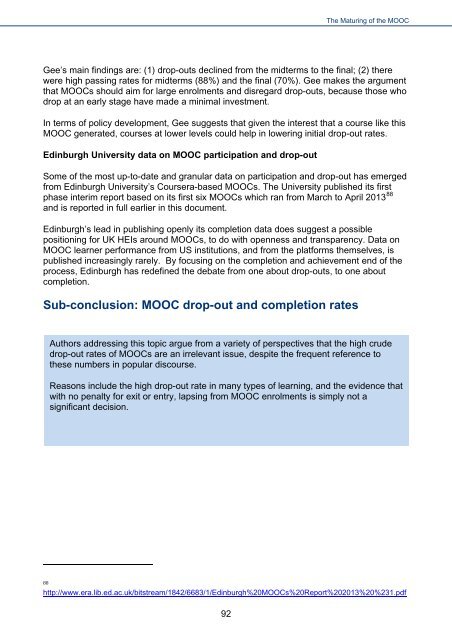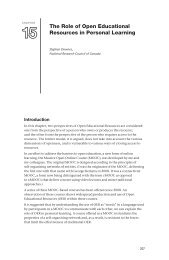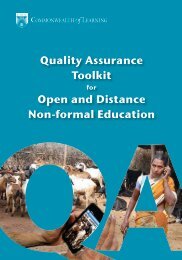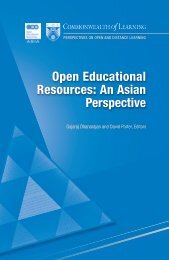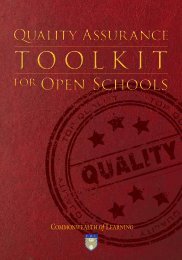The Maturing of the MOOC
The maturing of the MOOC: literature review of massive ... - Gov.uk
The maturing of the MOOC: literature review of massive ... - Gov.uk
- No tags were found...
You also want an ePaper? Increase the reach of your titles
YUMPU automatically turns print PDFs into web optimized ePapers that Google loves.
<strong>The</strong> <strong>Maturing</strong> <strong>of</strong> <strong>the</strong> <strong>MOOC</strong><br />
Gee’s main findings are: (1) drop-outs declined from <strong>the</strong> midterms to <strong>the</strong> final; (2) <strong>the</strong>re<br />
were high passing rates for midterms (88%) and <strong>the</strong> final (70%). Gee makes <strong>the</strong> argument<br />
that <strong>MOOC</strong>s should aim for large enrolments and disregard drop-outs, because those who<br />
drop at an early stage have made a minimal investment.<br />
In terms <strong>of</strong> policy development, Gee suggests that given <strong>the</strong> interest that a course like this<br />
<strong>MOOC</strong> generated, courses at lower levels could help in lowering initial drop-out rates.<br />
Edinburgh University data on <strong>MOOC</strong> participation and drop-out<br />
Some <strong>of</strong> <strong>the</strong> most up-to-date and granular data on participation and drop-out has emerged<br />
from Edinburgh University’s Coursera-based <strong>MOOC</strong>s. <strong>The</strong> University published its first<br />
phase interim report based on its first six <strong>MOOC</strong>s which ran from March to April 2013 88<br />
and is reported in full earlier in this document.<br />
Edinburgh’s lead in publishing openly its completion data does suggest a possible<br />
positioning for UK HEIs around <strong>MOOC</strong>s, to do with openness and transparency. Data on<br />
<strong>MOOC</strong> learner performance from US institutions, and from <strong>the</strong> platforms <strong>the</strong>mselves, is<br />
published increasingly rarely. By focusing on <strong>the</strong> completion and achievement end <strong>of</strong> <strong>the</strong><br />
process, Edinburgh has redefined <strong>the</strong> debate from one about drop-outs, to one about<br />
completion.<br />
Sub-conclusion: <strong>MOOC</strong> drop-out and completion rates<br />
Authors addressing this topic argue from a variety <strong>of</strong> perspectives that <strong>the</strong> high crude<br />
drop-out rates <strong>of</strong> <strong>MOOC</strong>s are an irrelevant issue, despite <strong>the</strong> frequent reference to<br />
<strong>the</strong>se numbers in popular discourse.<br />
Reasons include <strong>the</strong> high drop-out rate in many types <strong>of</strong> learning, and <strong>the</strong> evidence that<br />
with no penalty for exit or entry, lapsing from <strong>MOOC</strong> enrolments is simply not a<br />
significant decision.<br />
88<br />
http://www.era.lib.ed.ac.uk/bitstream/1842/6683/1/Edinburgh%20<strong>MOOC</strong>s%20Report%202013%20%231.pdf<br />
92


